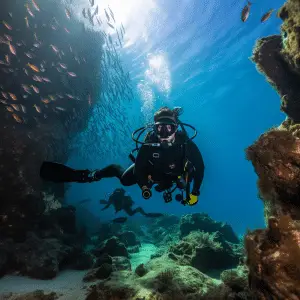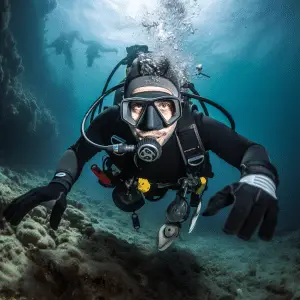What is PADI certification?
PADI certification is a must-have for those looking to explore the captivating underwater world. With this certification, divers gain the knowledge and skills to safely navigate beneath the waves. It serves as a standard of excellence, ensuring that divers are equipped with the right tools to explore underwater environments.
Plus, PADI certification is globally recognized, so divers can dive in any location without extra training! According to Scuba Diving Magazine, PADI is the largest diver training organization in the world, providing certifications to millions of divers annually. That’s why it’s important to get a PADI certification – so you can look like a superhero while discovering all the wonders of the ocean!
Why is PADI certification important?

To fully understand why PADI certification is important, let’s dive into the benefits of obtaining this certification. From enhanced diving skills to increased safety awareness, PADI certification opens doors for exploration, builds confidence, and connects you with a global community of passionate divers. Discover the profound advantages that come with becoming a PADI-certified diver.
Benefits of obtaining a PADI certification
Gaining a PADI certificate has plenty of perks worth considering! Let’s take a look at the advantages of becoming certified and find out why it’s a smart choice for aspiring divers.
- Enhanced Safety: Getting a PADI certificate can give you a better understanding of safety. Through their training courses, divers learn essential skills, like the proper use of equipment and techniques to respond to emergencies.
- Global Recognition: A PADI certificate is respected around the world. With over 6,600 centers in 180 countries, being certified allows you to explore beautiful underwater areas with no restrictions.
- Diversified Learning: PADI offers many specialized courses that suit all kinds of interests and skills. Whether you’re into underwater photography, wreck diving, or marine conservation, you’ll find the perfect opportunity to expand your knowledge.
- Social Connections: Becoming certified is also a great way to join the global diving community. You can meet like-minded people and share your love of marine exploration and conservation efforts.
- Environmental Awareness: PADI cares about preserving the environment. After completing the certification, divers gain knowledge about sustainable diving practices and become advocates for protecting ecosystems.
- Personal Growth: Obtaining a PADI certificate lets you gain valuable life skills. You’ll learn discipline, patience, problem-solving abilities, and build confidence by challenging yourself mentally and physically.
In addition, looking into a few other elements enhances the certification experience. Make sure to choose a trustworthy dive center or instructor who prioritizes safety without compromising on quality instruction. Being active in the diving community by attending local events or joining dive clubs will give you chances to learn and share experiences.
The process of getting PADI certified
To become PADI certified, you need to understand the process involved. Start by exploring the required courses for PADI certification. This sub-section will provide insights into the courses you must complete to obtain your certification.
Required courses for PADI certification
PADI, founded in 1966 by John Cronin and Ralph Erickson, is the world’s leading scuba diving training organization. It has created a standardized training system with international recognition. To meet the demands of modern-day adventurers, PADI’s curriculum has been constantly evolving.
So, here’s a breakdown of the courses:
- Open Water Diver Course – Learn basic scuba diving skills & gain confidence in open water.
- Advanced Open Water Diver Course – Enhance skills & explore various adventure dives, like navigation & underwater photography.
- Rescue Diver Course – Learn how to prevent & manage potential dive emergencies & develop self-rescue skills.
- Divemaster Course – Get hands-on experience in managing dives & gain knowledge about dive theory & leadership skills.
- Instructor Development Course (IDC) – Train on teaching techniques, standards, safety procedures, & evaluation methods.
Each diver’s journey is unique, but don’t fear the unknown – find the perfect PADI certification level & jump into the deep blue!
How to choose the right PADI certification level

To choose the right PADI certification level for your diving journey, explore the different PADI certification levels. Understand the benefits and requirements of each level, such as Open Water Diver, Advanced Open Water Diver, Rescue Diver, Divemaster, and more.
Exploring different PADI certification levels
Choosing the right PADI certification level can be both exciting and important. Here, we’ll provide you with a professional overview of the different levels to help you make an informed choice.
Let’s take a look at the certifications levels and their requirements:
| Certification Level | Required Training | Depth Limit |
|---|---|---|
| Open Water Diver | Classroom sessions | 60 feet |
| Advanced Open Water Diver | Five specialty dives | 100 feet |
| Rescue Diver | First Aid/CPR Training | N/A |
| Divemaster | Dive Theory Knowledge | Unlimited |
| Instructor | Instructor Course | Unlimited |
The levels build upon each other, giving divers more knowledge and skill as they progress. For example, Advanced Open Water Diver introduces divers to specialty dives like night diving and underwater navigation.
Depth limits vary, depending on environmental factors and individual capabilities. Always adhere to safe diving practices and consider your comfort level when choosing a certification level.
Pro Tip: It’s not just about reaching new depths, but expanding knowledge and skills too. Take time to evaluate your goals and interests before making a decision. Happy diving!
